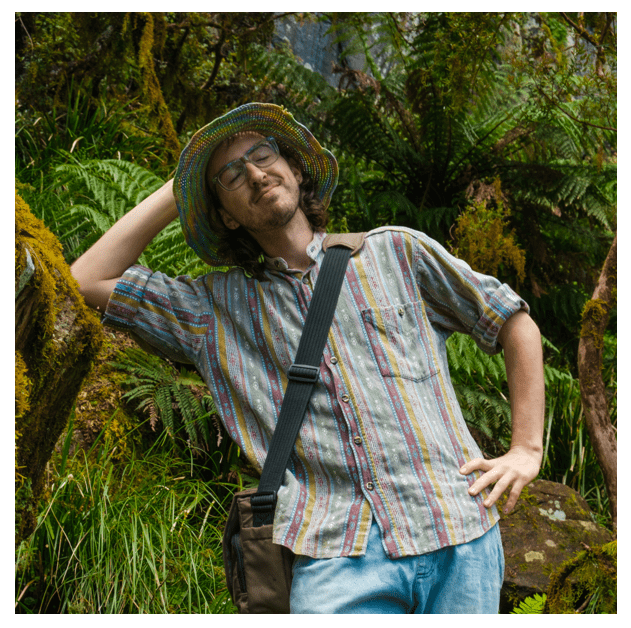Growing up, Calliden Hunter wanted to be a national park. Unsurprisingly, that hasn’t come to pass, but the University Medal winner has spent his successful UNE Theatre and Performance Honours year exploring what it means to be part of the environment.
Calliden – whose name stems from ‘Callidendrous forest’ – a Tasmanian cool temperate rainforest, has always been interested in art, science and philosophy and has managed to find where they intersect through his love of drama.
“One of the great things about the UNE Bachelor of Theatre and Performance with Honours is that it gave me a lot of freedom to choose electives outside the theatre major. I got to fill in the gaps with things like music, literature or philosophy. I got to follow what I love,” he says.
At the time of selecting a thesis topic, Australia was suffering through drought and the choking, scarring effects of bushfires. It was a time when he personally felt the concepts of ‘climate grief’ and ‘ecological anxiety’, which became the basis for his work.
“It’s easy to think we’re separate from nature in some way, but that doesn’t really hold up when you’re breathing the smoke from the bushfires,” he says.
“I knew that theatre wasn’t going to ‘solve’ climate change, but I figured theatre’s purpose isn’t really to settle on logical solutions to complex problems. We don’t grieve by problem-solving, but by feeling into our grief.”
“Because of its ambiguity, addressing the topic of grief is probably something theatre is especially suited to.”
Calliden’s search for ways to depict the ecosystemic collapse and grief in a play for his thesis – eventually named WEATHER – led him down the track of gothic horror, amongst other things, particularly inspired by the eerie, strange figures skulking in the pages of H.P Lovecraft’s cosmic horror tales.
And if the task he set himself to complete in a year wasn’t complex enough, he also had his own lurking fears and difficulties to contend with.
“At the end of my HSC I was half convinced that I wouldn’t get into university, and in fact I didn’t even meet the ATAR requirements for my nominated course. I’d been told I’d never get into or through university with my work ethic, and that I wasn’t living up to my potential.”
“It wasn’t until doing this Honours project that I sought a diagnosis for my ADHD which brought a lot of clarity – and tools – for me. I think being able to focus my energies into something self-directed, and that I had a passion for, meant that I had the drive to push through some of those blocks.
Not that it wasn’t a struggle at times.
“Finishing my Honours was the hardest thing I’ve ever done, and there were many points where I almost didn’t. But I was determined to finish it, so it forced me to learn how I need to work to get work done.”
His dedication has paid off. Calliden will be awarded a University Medal at UNE’s Autumn Graduation Ceremony this April for outstanding academic results.
UNE Theatre and Performance Lecturer Dr Richard Jordan says Calliden’s thesis, Weird theatre: Ecology and unhumanity “demonstrated an advanced level of artistry and scholarship.”
But like an ecosystem, Calliden says his success hasn’t happened in isolation.
“I really wouldn’t have been able to get through this without help from a few different people, especially from my supervisor Dr Julie Shearer. She was very understanding that life doesn’t stop for uni, and did all she could to help me during a difficult pandemic year. My family were there to help me through and bounce ideas off, my partner stuck with me through those isolating assessment periods and my psychologist helped me find my strength and confidence when I was struggling the most.
“It’s definitely a surprise to win the University Medal, but a totally welcome one! It’s validating to know that this thing I dedicated myself to for more than a year resonates with others. It’s especially validating given the struggle it took to get there.”



Recent Comments